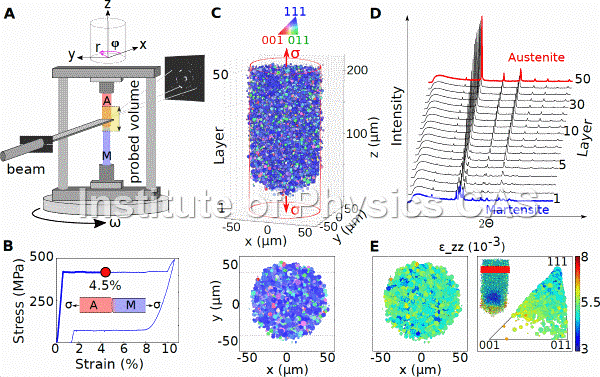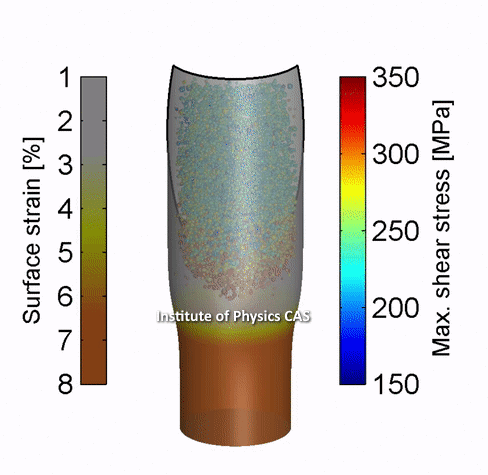You are here
3D-XRD method
3D-XRD method

Figure 1: The 3D-XRD method enables nondestructive evaluation of the grain microstructure, elastic strains and stresses in a polycrytal exposed to external load. Superelastic NiTi wire was stretched till the mid of the transformation plateau (B) and wire segment containing the martensite band front was analyzed in the 3D-XRD experiment (A) at the ID11 beamline at ESRF Grenoble. Grain microstructure(C) was reconstructed from 36650 2D diffraction patterns obtained from the wire rotated and scanned with respect to the sychrotron beam. The 3D-XRD data were analysed to obtain information on grain size and grain orientation (C), grain strains (E) and finally the evolution ofaustenite/martensite phase volume fraction along the wire.
Analysis of the 3D-XRD data
The austenite microstructure obtained by the analysis of the 3D-XRD data were confronted with the results of ex-situ 3D-EBSD analysis of a wire segment (Fig. 2)

Figure 2: 3D microstructure of the NiTi wire evaluated nondestructively by the 3D-XRD method (D-F) is compared with the 3D representation of microstructure obtained by the FIB-SEM sectioning destructive method (A-C). Orientation dependence (B,E) and statistics on grain size distribution (C,F) evaluated by both methods are compared.
The results of the analysis of grain resolved stresses and strains (Fig.3) in the NiTi wire are reported separately - see Strain & Stress by 3D-XRD

Figure 3: The complete 3D-XRD dataset contains information on the grain size, grain position, crystal lattice orientation, strain tensor and stress tensor in each of the ~15000 austenite grains within the scanned segment of the NiTi wire.
The grain resolved stresses and strains were averaged and interpolated to derive internal macroscopic elastic strain and stress fields in the wire. The complete Martensite Band Front was reconstructed with the help of FE simulation of localized deformation..
Take away
3D-XRD method allows for determination of positions, sizes, lattice orientations and 6 independent components of elastic strain tensor and stress tensor in a large number (~15000) of relatively small austenite grains (~6 µm) within 0.1 mm thin NiTi wire exposed to external load.
The complete 3D-XRD Dataset is available for further analysis by interested readers.
Rychlé odkazy
Copyright © 2015 OFM AV ČR, v. v. i.
